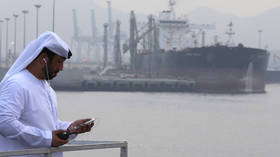UAE
says commercial ships targeted by ‘sabotage,’ amid rising Gulf
tensions

RT,
13 May, 2019
The United Arab Emirates has said that four commercial ships were hit by “sabotage” in its waters, hours after denying reports of explosions at an oil tanker terminal. The incident comes as US/Iran tension ratchets up.
The four vessels were targeted by “sabotage operations” in waters near the emirate of Fujairah, the country’s foreign ministry said on Sunday. The exact nature of the sabotage was not revealed, nor were the nationalities of the ships. There were no reported casualties.
“Subjecting commercial vessels to sabotage operations and threatening the lives of their crew is considered a dangerous development,” the foreign ministry said in a statement, adding that it is investigating the alleged incident.
The statement came hours after Fujairah’s government denied reports that an explosion had rocked an oil terminal at the emirate’s port. Lebanese broadcaster Mayadeen first reported the explosion, before the story was picked up by Iran’s Press TV. Officials in Fujairah called on the media to “investigate accurately and rely on official sources.”
ALSO ON RT.COM‘Our aim is not war,’ Pompeo insists as US warships & bombers gather off coast of Iran
Although the exact events are unknown, Iranian lawmaker Heshmatollah Falahatpisheh tweeted that “the explosions of Fujairah showed that the security of the south of the Persian Gulf is like glass.”
Should the security situation in the region deteriorate, much is at stake. Fujairah backs on to the Gulf of Oman on the south side of the Strait of Hormuz. With the UAE and Saudi Arabia on one side and Iran on the other, one-third of the world’s oil at sea transits the strait, which is only 39 kilometers wide.
The UAE did not directly blame Iran for the alleged sabotage, but its claim comes just days after the United States Maritime Administration warned that “Iran and/or its regional proxies could take action against US and partner interests, including oil production infrastructure” in the region. Saudi Arabia and the UAE are steadfast American allies.
Egypt, another American ally in the Middle East, sided with the UAE's take on events, condemning the alleged act of sabotage later on Sunday night.
Iran has insisted that it has no interest in escalating tensions in the region, yet the US has pressed ahead with the deployment of a carrier strike group and an Air Force bomber group to the region, to protect US interests from the unspecified threat. The USS Abraham Lincoln passed through Egypt’s Suez Canal on Thursday, in what National Security Advisor John Bolton called a “clear and unmistakable message” to Tehran.
The carrier will be joined by a battery of Patriot missiles and a transport ship – the USS Arlington – the Pentagon announced on Friday. Still, State Secretary Mike Pompeo assured the world that “our aim is not war, our aim is a change in the behavior of the Iranian leadership.”
Details about the “intelligence” used to justify the buildup are thin on the ground. A CNN report on Friday warned that Iran’s elite Islamic Revolutionary Guard Corps may be planning on launching missiles from small civilian boats, citing an anonymous “defense official.” The network’s report has not yet been substantiated. Multiple sources within the US government have said that Bolton and Pompeo are “overreacting” to the threat posed by Iran, and “mischaracterizing”intelligence reports.
Iran has matched the US in the rhetoric game, with IRGC aerospace head Amirali Hajiadeh telling the Iranian Students’ News Agency that an aircraft carrier parked in the Gulf provides “opportunities” for Iran to test its missile capabilities. Ayatollah Yousef Tabatabai-Nejad also warned Washington that a single missile from Iran could easily sink its “billion-dollar fleet.”



No comments:
Post a Comment
Note: only a member of this blog may post a comment.